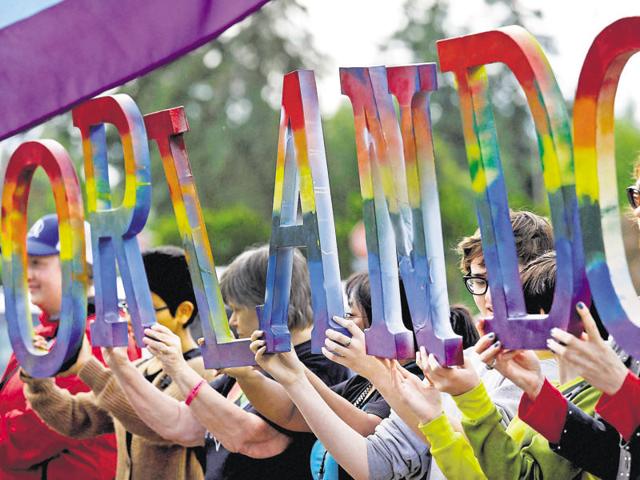How we label a crime says a lot about our own priorities
A tragedy can be the starting point of change, and while changing laws don’t always immediately result in social change, scrapping Section 377 would at least be a beginning, and a fitting homage to 49 dead in Orlando. It would affirm their humanity — and ours
In the week that his nation was celebrating his grandmother’s 90th birthday, Prince William was making his own bit of history by becoming the first royal to pose for the cover of a gay magazine, Attitude. To make clear his concerns, the prince also invited members of the LGBT community to Kensington Palace to talk about bullying and its mental health repercussions.

In Mexico, President Enrique Pena Nieto proposed on Tuesday to legalise same-sex marriage across the country, and not just in Mexico City and a few other jurisdictions. For good measure, his Twitter page and other government Twitter accounts were tinted with rainbow colours.
Last month, Victoria’s state Parliament apologised for laws that once criminalised homosexual activity. Earlier, Colombia became the fourth South American country to achieve marriage equality.
It’s been a reasonably good year for LGBT rights around the world until that horrific carnage at a gay club in Orlando , Florida, left 49 people dead and many more injured. Much of the commentary around the shooting has focused on the religion of the killer, Omar Mateen, his links, imagined or otherwise, to Islamic State, terrorism, gun control and even the political fallout and its impact on the US presidential elections this year.
But equally it has focused on the state of gay rights and overt homophobia.
Read | Orlando shooting not an isolated event; gay community has been targeted before
India, along with 74 other countries, continues to criminalise homosexual activity. In 2013 the Supreme Court reversed an earlier Delhi High Court ruling that read down Section 377, which makes sex against ‘the order of nature’, a crime. This has led to “an increase in the expression of homophobia”. AIDS activist L Ramakrishnan told Scroll.in.
Read | SC hearing on gay sex: All you need to know about Section 377
Earlier this month, the NGO Mingle (Mission for Gay and Lesbian Empowerment) released the findings of its study into the workplace experiences of the LGBT community in India. The study makes for grim reading — homophobia is rampant and discrimination is commonplace.
In our laws, at our workplaces and through our social interactions we continue to discriminate against sexual orientation. Chief among these is a refusal to even acknowledge homosexuality and a thinking among many parents that marriage is a ‘panacea’ to their sons’ orientation or an insistence that homosexuality is a ‘disease’ that can be cured.
It is this denial that led to a furore, at least in some circles, over PM Narendra Modi’s tweet: “Shocked at the shootout in Orlando, USA. My thoughts & prayers are with the bereaved families and the injured”. The reaction was vociferous. “There’s no point of giving ‘thoughts & prayers’ to the families of the LGBTQ community in Orlando if you don’t walk the talk,” tweeted a handle that goes by the name @visualfumble. “A tweet that is only a half truth,” lamented Apurva Asrani, writer and editor of Aligarh, the film about the real life persecution of Prof Shrinivas Ramchandra Siras for being gay.
Read | Grieve for Orlando, Mr Prime Minister, but don’t forget LGBT Indians
It is possible for a single terror attack to have multiple meanings and ramifications. Orlando is both a terrorist attack and a homophobic attack. Its impact is likely to be felt on both US domestic politics and international security. In the short term it will inevitably influence perceptions of Islam as well as the domestic extremism.
How we label a crime says a lot about our own priorities, which is why Modi’s omission is significant. Yet, Modi was not expressing a lone view as much as a more widely prevalent one. It’s the sort of view that led to the defeat of Congress MP Shashi Tharoor’s bill to decriminalise homosexuality. It’s the sort of view that has led to so many of us — myself included — being unable to shake off our apathy and march at gay pride celebrations. It’s the sort of view that allows a moribund British era colonial law to continue on the statute books of independent India.
Read | SC was wrong on Section 377, but now there’s hope
A tragedy can be the starting point of change, and while changing laws doesn’t always immediately result in social change, scrapping Section 377 would be a beginning, and a fitting homage to 49 dead in Orlando. It would affirm their humanity — and ours.




